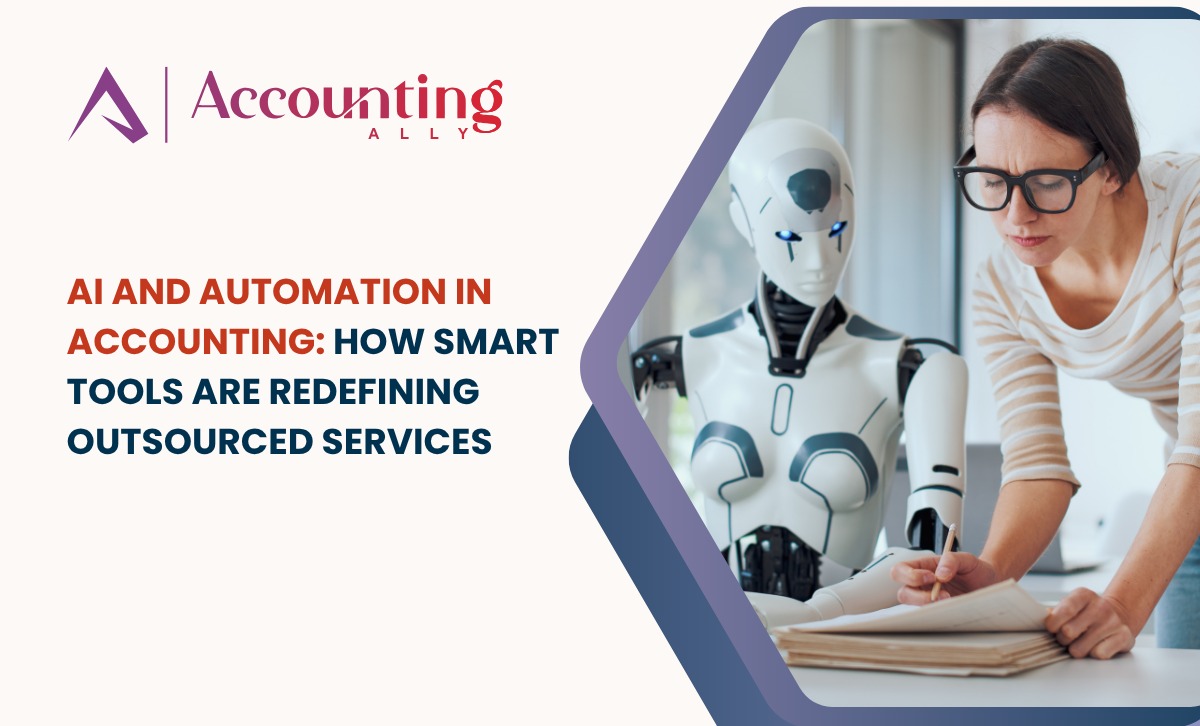AI and Automation in Accounting: How Smart Tools Are Redefining Outsourced Services

The accounting industry has entered a new era. With the rise of artificial intelligence (AI) and automation, businesses worldwide are rethinking how they manage financial operations. AI and Automation in Accounting are no longer optional—they’re rapidly becoming essential tools for staying competitive. In particular, outsourced accounting services are experiencing a seismic shift—one that’s redefining efficiency, accuracy, and value. For small businesses, startups, and even large corporations, this transformation is more than just a trend—it’s an opportunity to thrive in an ever-changing digital landscape.
In this comprehensive blog, we’ll explore how AI and automation are transforming outsourced accounting, the challenges and opportunities this revolution presents, and why now is the ideal time to outsource bookkeeping for small business needs. We’ll also highlight how tools, strategies, and even models like Satellite (a metaphor for remote yet precise systems) are reshaping the accounting function globally.
The New Era of Accounting: Automation and AI Take Center Stage
Accounting has traditionally been viewed as a manual, time-intensive process. From managing ledgers and processing invoices to generating financial reports and ensuring compliance, accountants have long been burdened with repetitive, data-heavy tasks. Enter automation and AI.
AI brings intelligence to data processing. It can analyze trends, detect anomalies, and even predict future financial behaviors. Automation, on the other hand, handles rule-based processes—like reconciling accounts or updating ledgers—at scale and speed.
Combined, these technologies empower outsourced accounting services to offer faster, smarter, and more accurate support to businesses.
Why AI Matters in Outsourced Accounting
Let’s break down how AI specifically enhances accounts outsourcing:
1. Faster Data Processing
The accounting industry has entered a new era. With the rise of artificial intelligence (AI) and automation, businesses worldwide are rethinking how they manage financial operations. AI and Automation in Accounting are no longer optional—they’re rapidly becoming essential tools for staying competitive. In particular, outsourced accounting services are experiencing a seismic shift—one that’s redefining efficiency, accuracy, and value. AI-powered systems can ingest and process vast volumes of data in minutes—tasks that would take humans hours or even days. This enables outsourced teams to generate real-time insights and reporting, giving businesses a more accurate and timely view of their financial health. For small businesses, startups, and even large corporations, this transformation is more than just a trend—it’s an opportunity to thrive in an ever-changing digital landscape.
2. Advanced Fraud Detection
Machine learning algorithms can spot irregular transactions, duplicate entries, and potential fraud risks far more effectively than traditional methods.
3. Predictive Analytics
AI can identify financial trends, forecast cash flow, and predict customer payment behavior—giving business owners a clearer path to informed decision-making.
4. Intelligent Automation
With robotic process automation (RPA), repetitive tasks like invoice matching, bank reconciliations, and payroll processing are executed automatically, freeing up human accountants to focus on strategic work.
The Role of Automation in Accounts Outsourcing
Automation is the backbone of modern outsourced accounting services. It enables outsourcing providers to standardize operations and ensure accuracy across multiple clients and jurisdictions.
Key Areas Where Automation Excels:
- Accounts Payable and Receivable: Automated systems can send reminders, generate invoices, match payments, and handle exceptions with minimal manual intervention.
- Bank Reconciliation: Connecting directly with bank feeds, automation tools can reconcile thousands of transactions with high accuracy.
- Expense Management: Software can capture, categorize, and process employee expenses in real-time.
- Tax Preparation and Filing: Automation ensures up-to-date tax codes are applied, reduces errors, and accelerates compliance filing.
The Satellite Model: Remote Precision in Outsourced Accounting
Let’s use the term Satellite as a metaphor for modern outsourcing—remote, efficient, intelligent systems orbiting around a business’s financial ecosystem. Much like a satellite captures real-time data from space and transmits it to Earth, AI and Automation in Accounting tools used by outsourced accounting services gather financial insights remotely and deliver value instantly. This model ensures that businesses are no longer dependent on in-house teams or local providers. Instead, they can access global talent, 24/7 support, and AI-powered platforms—all at a fraction of the cost.
Opportunities in AI-Driven Accounts Outsourcing
The integration of AI and automation opens a world of possibilities. Here are the top opportunities for businesses considering outsourced accounting:
1. Scalability
With automation, accounting services can scale up or down based on business needs. Startups can get enterprise-level support without the enterprise price tag.
2. Cost Efficiency
Automated workflows reduce the hours needed for manual tasks. This leads to lower labor costs and higher returns on investment.
3. Global Accessibility
Using cloud-based systems, businesses can access financial dashboards and reports from anywhere. This remote accessibility aligns with the Satellite model—where distance no longer compromises precision.
4. Real-Time Decision Making
Outsourcing firms leveraging AI can provide up-to-the-minute data, empowering business leaders to make timely, informed decisions.
5. Enhanced Accuracy
Automation minimizes human errors, ensuring compliance and audit readiness.
Challenges in AI-Powered Outsourced Accounting
As with any technological transformation, there are challenges to consider:
1. Data Security
With sensitive financial data being transferred to third-party providers, businesses must ensure their partners follow strict cybersecurity protocols.
2. Integration Complexity
Aligning AI tools with existing systems—especially in legacy companies—can be a hurdle. It requires planning, investment, and expertise.
3. Change Management
Some staff may resist the adoption of AI tools, fearing job displacement. It’s important to focus on retraining and reskilling teams to thrive in a digital-first environment.
4. Overdependence on Automation
Blind trust in automation can lead to oversight. Human review remains essential for complex, high-stakes financial decisions.
Outsource Bookkeeping for Small Business: A Smart Move
For small businesses, bookkeeping often falls low on the priority list. Yet, it’s one of the most crucial pillars for sustainability and growth. Outsourcing this function—especially to a provider that integrates AI and Automation in Accounting—can be a game-changer. AI-powered systems can streamline processes, reduce errors, and provide real-time insights, allowing small businesses to focus on growth while maintaining financial accuracy and compliance.
Benefits for Small Businesses:
- Focus on Core Activities: Let the experts handle the numbers while you focus on growth.
- Access to Advanced Tools: Small businesses often can’t afford the latest software, but outsourcing gives them indirect access.
- Improved Compliance: Stay on top of tax filings, financial statements, and regulatory requirements.
- Cost Savings: Avoid hiring in-house bookkeepers and investing in training and tools.
When you outsource bookkeeping for small business, you gain not just expertise but also peace of mind.
Real-World Use Cases: AI in Action
Case Study 1: Automating Invoicing for a Startup
A tech startup outsourced its bookkeeping to a cloud-based firm using automation tools like QuickBooks and Xero. By integrating AI and Automation in Accounting, the firm enabled automated invoice creation, payment follow-ups, and real-time cash flow dashboards—cutting administrative time by 70%. This shift not only improved efficiency but also allowed the startup to focus on strategic growth initiatives rather than manual accounting tasks.
Case Study 2: Predictive Analytics for a Retail Chain
A retail company engaged an outsourced accounting firm with AI and Automation in Accounting capabilities. The system used predictive analytics to analyze seasonal trends and customer behavior, helping the business optimize inventory and reduce waste by 25%. By leveraging AI, the company gained actionable insights that led to smarter purchasing decisions, improving both profitability and operational efficiency.
Case Study 3: Satellite Office Accounting for a Global Nonprofit
A global nonprofit used a Satellite-style model by outsourcing to a firm with international reach. Using AI-powered dashboards, the nonprofit could monitor expenses across regions and stay compliant with various donor regulations.
The Future of Outsourced Accounting: What to Expect
As technology evolves, outsourced accounting services will continue to adapt. Here are a few future-forward trends:
1. Blockchain Integration
Blockchain can enhance transparency and auditability in financial transactions.
2. Voice-Activated Accounting
AI assistants may soon manage invoices, reports, and updates via simple voice commands.
3. Hyper-Automation
Combining AI, RPA, and machine learning, hyper-automation will allow full end-to-end processing with minimal human input.
4. Personalized Financial Advice
AI will offer more than data—it will interpret insights and suggest strategies tailored to each business.
How to Choose the Right Outsourced Accounting Partner
The benefits are clear—but not all providers are created equal. Here’s what to look for:
- AI and Automation Capabilities: Ensure the firm uses modern tools.
- Security Standards: Ask about encryption, data backups, and compliance measures.
- Industry Experience: Choose a firm that understands your sector.
- Scalability: Make sure they can grow with you.
- Transparent Pricing: Avoid hidden fees and complicated contracts.
Choosing the right outsourced accounting partner is a critical decision that can directly impact your financial accuracy, compliance, and long-term growth. As AI and automation become integral to modern outsourced accounting services, it’s essential to work with a provider that not only understands your industry but also leverages cutting-edge technology to deliver value. Look for firms that offer transparent pricing, secure data handling, and flexible service plans tailored to your needs. A strong partner should have proven expertise in accounts outsourcing, a clear strategy for integrating with your existing systems, and a client-first approach. Whether you’re aiming to outsource bookkeeping for small business operations or scale your financial reporting through intelligent automation, the right partner will act as an extension of your team—driving accuracy, insights, and cost-efficiency. Always ask about their use of AI tools, data protection protocols, and how they handle challenges and opportunities in your specific sector.
Final Thoughts: Embrace the Change
AI and automation aren’t here to replace accountants—they’re here to enhance their value. By removing the grunt work, these technologies allow professionals to focus on strategy, insights, and decision-making.
For businesses looking to grow, streamline operations, or simply gain more control over their finances, the decision to outsource bookkeeping for small business or embrace accounts outsourcing has never been more rewarding.
The challenges and opportunities in this space are real—but so are the rewards. As we move into a more connected, intelligent future, your accounting shouldn’t be left behind. Whether you’re a small business, a nonprofit, or a fast-scaling startup, the Satellite of smart, remote, tech-enabled financial management is within your reach.

